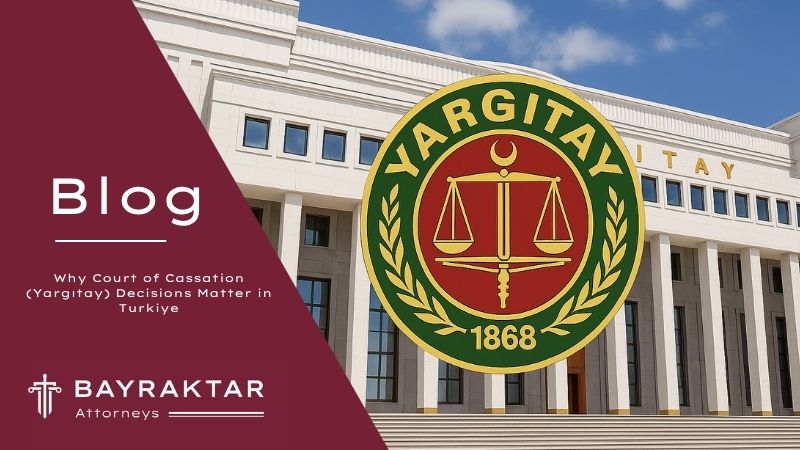
Understanding the Role of Yargıtay in the Turkish Legal System
The Court of Cassation, known as “Yargıtay” in Türkiye, is one of the six highest judicial bodies in the country and plays a critical role in upholding legal consistency across the national court system.
Yargıtay serves as the final review authority for decisions rendered by civil, criminal, and commercial courts, ensuring that lower court rulings comply with the law. This function makes it a cornerstone of the Turkish legal structure and an indispensable pillar of the rule of law.
What Is Yargıtay?
Yargıtay is Türkiye’s highest court of appeal for civil and criminal matters. It reviews judgments made by courts of first instance and regional appellate courts.
As a court of last resort, Yargıtay determines whether these judgments were made in accordance with legal principles, procedures, and precedents. If it finds an error in legal interpretation or application, it has the authority to overturn (or "quash") the decision.
Because of its final authority in appeal matters, Yargıtay is also referred to as the “Court of Cassation” or “the Supreme Court of Appeals.” Its decisions shape the uniform application of Turkish law across the country.
Why Are Yargıtay Decisions Important?
Yargıtay’s judgments are vital for several reasons:
Ensuring Legal Uniformity: One of the primary purposes of Yargıtay is to ensure consistency in how laws are interpreted and applied by lower courts across the country.
Correcting Legal Errors: Yargıtay reviews cases not to retry facts but to verify the correct application of legal rules. If it identifies procedural or legal errors, it can send the case back to the lower courts for reconsideration.
Setting Judicial Precedents: Although Türkiye does not follow a strict precedent system like common law countries, Yargıtay decisions still serve as persuasive authority. Lower courts often refer to these rulings when deciding similar cases.
Safeguarding the Rule of Law: Yargıtay functions as a check on arbitrary or inconsistent rulings from lower courts, reinforcing the rule of law and citizens’ trust in the judiciary.
Can Every Court Decision Be Appealed to Yargıtay?
In most civil, criminal, and labor cases, parties have the right to appeal to Yargıtay, as long as they meet the deadlines set by law. There is no need to explain the appeal based on specific legal reasons. Simply submitting it on time is enough.
This right is a key part of a democratic legal system and supports the principle of access to justice.
In addition, parties do not need to be physically present to appeal. A lawyer may file an appeal on their behalf during court proceedings or afterward.
The Process: What Happens After an Appeal?
When an appeal is filed with Yargıtay, the court reviews the decision of the lower court solely from a legal perspective. It does not reexamine witnesses or facts unless they pertain to a legal procedural flaw. The court can:
Approve (affirm) the lower court’s decision.
Overturn (quash) the ruling and send it back for a retrial.
Partially affirm or partially overturn the decision.
If Yargıtay quashes the decision, the lower court must comply with its legal reasoning unless the case is heard by a larger chamber or general assembly within Yargıtay, in which case a broader review occurs.
Also Read; Appealing final court decisions in Turkey at constitutional court
Backlog and Reforms in the Court of Cassation
Given its central role, Yargıtay receives a large volume of appeals each year. In fact, the number of incoming files has led to delays in some cases, with certain rulings taking years to finalize. To address this, the Turkish government implemented several reforms.
In 2011, the number of chambers in Yargıtay was increased from 32 to 38, and the number of judges from 250 to 387. This number further increased in 2014, with Yargıtay reaching 46 chambers and 516 members. These reforms were designed to improve efficiency and reduce judicial delays.
Practical Impact on Litigants and Legal Strategy
For litigants, the importance of Yargıtay lies in its ability to reverse unjust decisions and reinforce correct legal reasoning. For lawyers, Yargıtay rulings offer interpretive guidance, helping them develop persuasive arguments and anticipate potential legal outcomes.
Yargıtay also affects ongoing and future litigation by setting expectations for procedural fairness and substantive justice. A well-prepared appeal referencing similar Yargıtay decisions may increase the likelihood of success at the lower court level.
Conclusion
In conclusion, Yargıtay is not merely another step in the legal process — it is the ultimate guarantor of legal consistency and fairness in Türkiye. Whether you're dealing with a civil lawsuit, a criminal appeal, or a commercial dispute, the Court of Cassation plays a decisive role in shaping how justice is ultimately served.
If you're a foreign investor, business owner, or expatriate navigating Türkiye's legal system, it is critical to understand the weight Yargıtay decisions carry. At Bayraktar Attorneys, we closely monitor recent rulings and incorporate their logic into your case strategy to give you the highest chance of success.
Recently Added Blogs



.png)
.png)
.png)
.png)
